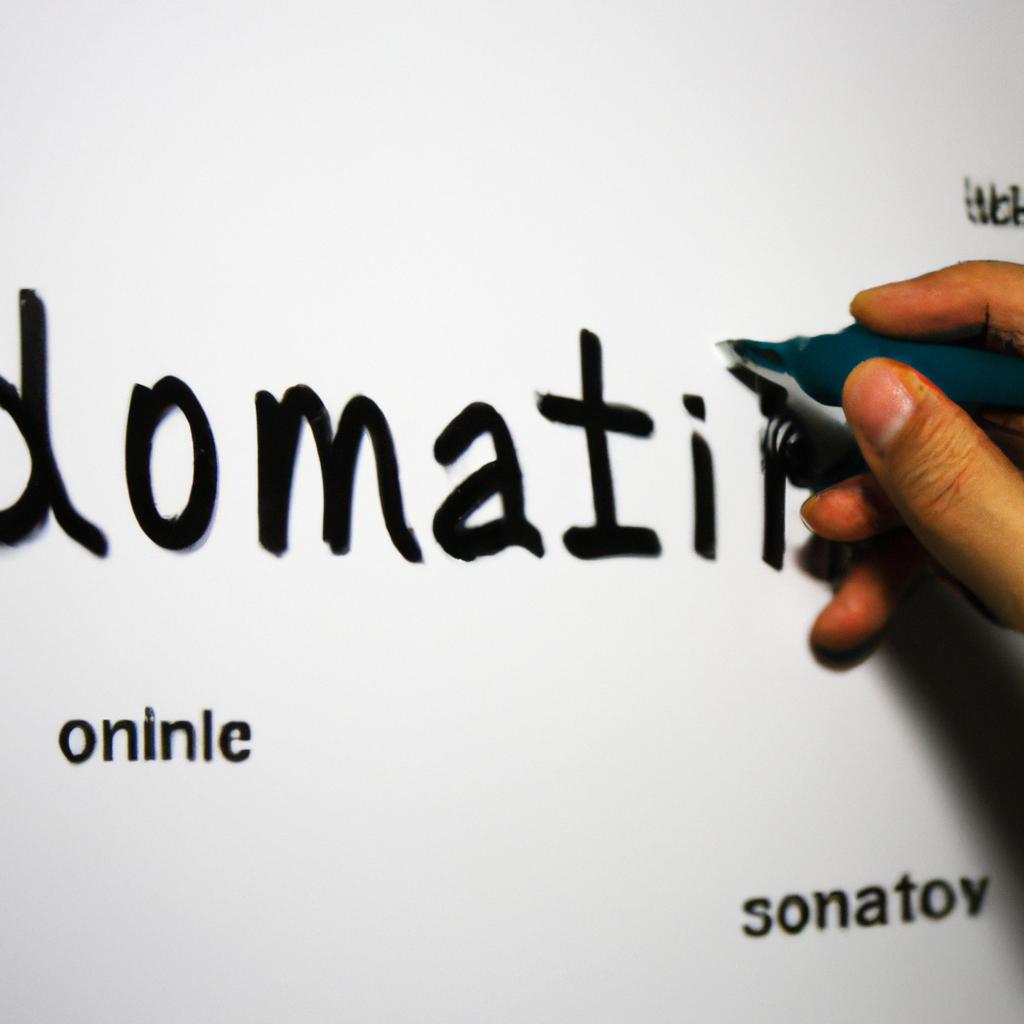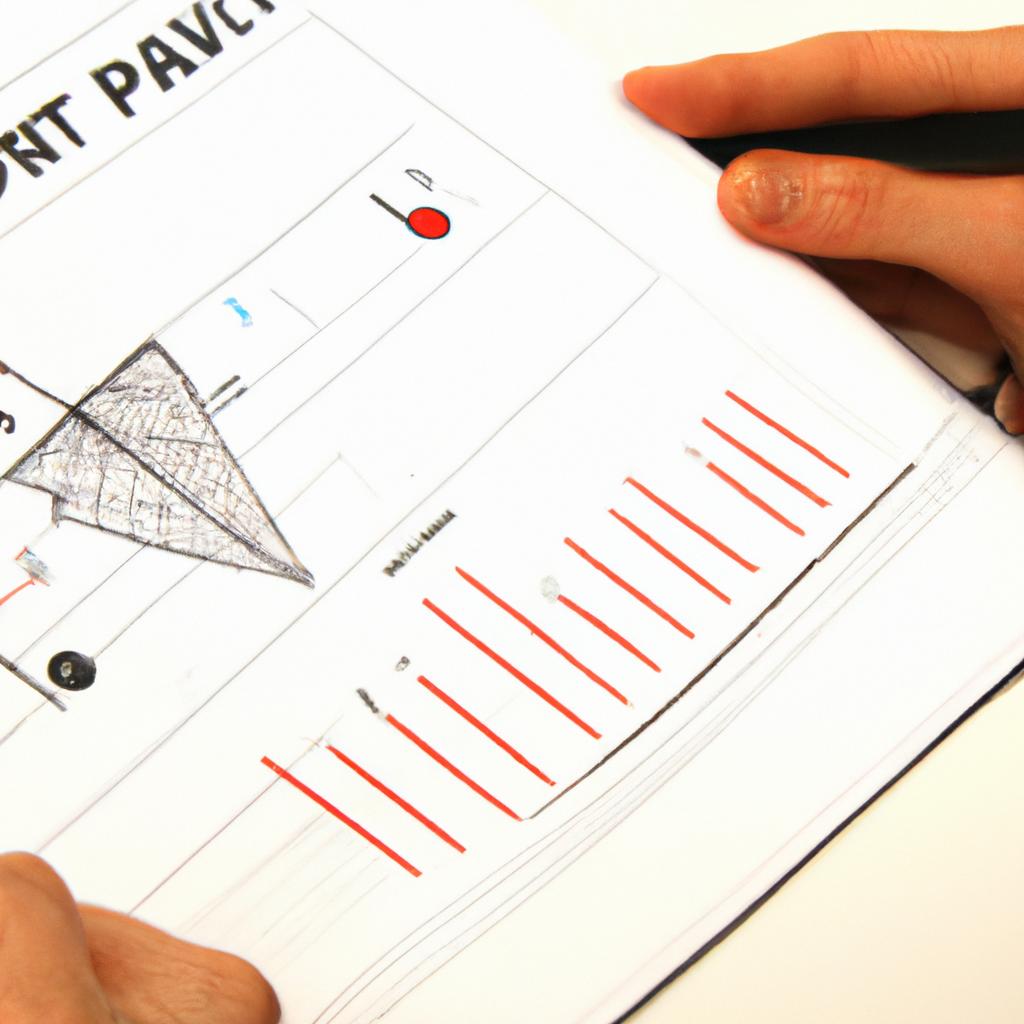Domain Name Valuation in Business Appraisal: Intellectual Property Valuation and Services

In the realm of business appraisal, one often overlooked yet crucial aspect is the valuation of domain names. A domain name serves as a digital address for businesses, playing an integral role in their online presence and branding strategies. Just like any other intellectual property asset, such as patents or trademarks, domain names hold intrinsic value that can significantly impact a company’s overall worth. For instance, consider the case of XYZ Corporation—a global e-commerce giant whose success heavily relies on its distinctive and memorable domain name. The value attributed to this domain name directly affects the company’s market position, investor perception, and potential for future growth.
The process of assessing the value of a domain name requires careful analysis and consideration of various factors. Intellectual property valuation professionals employ methodologies derived from economic principles and industry-specific knowledge to arrive at an accurate estimate. These methods encompass both quantitative approaches—such as income-based models utilizing cash flow projections—and qualitative aspects that examine brand recognition, market relevance, and competitive advantage associated with the domain name under evaluation. By thoroughly evaluating these dimensions, experts can provide businesses with invaluable insights into their intangible assets’ true worth—an essential component for making informed strategic decisions concerning acquisitions, sales transactions, or leveraging intellectual property rights for financial purposes.
Understanding how to properly appraise Understanding how to properly appraise a domain name involves considering its uniqueness, relevance, and market demand. One key factor is the length and memorability of the domain name. Shorter and more memorable names tend to have higher value due to their ease of use and potential for brand recognition. Additionally, the industry or niche that the domain name relates to can impact its value. A domain name that aligns well with a specific industry or target audience may be more valuable than a generic or unrelated name.
Furthermore, the age of the domain name can play a role in its appraisal. Older domain names are often seen as more trustworthy and authoritative, which can increase their value. The presence of keywords within the domain name that are relevant to a particular industry or topic can also enhance its worth.
Other factors to consider include search engine optimization (SEO) potential, existing traffic and backlinks, social media presence, trademark issues, and any history of previous sales or offers for the domain name.
By thoroughly evaluating these aspects and utilizing appropriate valuation methodologies, businesses can determine the fair market value of their domain names and make informed decisions regarding their utilization or monetization strategies.
Understanding Domain Name Valuation
Domain names have become a valuable asset in the digital era, with their importance extending beyond mere online addresses. In today’s business landscape, domain name valuation plays a crucial role in assessing the worth of intellectual property assets. To comprehend this process, it is essential to examine the factors that contribute to the determination of a domain name’s value.
To illustrate this point, let us consider the hypothetical case study of Company X. The company owns two domain names: “brand1.com” and “brand2.com.” Despite both domains having similar characteristics and generating an equal amount of web traffic, “brand1.com” is valued significantly higher than “brand2.com.” This discrepancy arises from various factors that influence domain name valuation.
In analyzing domain name value, several key elements come into play:
- Brand recognition: A well-established brand commands more attention compared to lesser-known ones. Consequently, a domain associated with a recognized brand holds greater value.
- Keyword relevance: Domains that incorporate relevant keywords perform better in search engine rankings. As such, they attract more organic traffic and are considered more valuable.
- Extension type: Different top-level domains (TLDs) carry different levels of credibility and trustworthiness. For instance, “.com” extensions tend to be favored over others due to their widespread usage.
- Market demand: The supply and demand dynamics within specific industries also affect domain name valuation. If multiple businesses compete for a particular domain, its value increases accordingly.
By understanding these factors influencing domain name valuation, individuals can make informed decisions when appraising their intellectual property assets. In the subsequent section about “Factors Influencing Domain Name Value,” we will delve deeper into each element mentioned here and explore additional aspects contributing to the overall appraisal process.
Factors Influencing Domain Name Value
Understanding Domain Name Valuation is crucial in the field of business appraisal, particularly when it comes to Intellectual Property (IP) valuation and services. To further explore this topic, let us consider a hypothetical example: a startup company specializing in e-commerce has recently acquired a highly sought-after domain name that aligns perfectly with their brand. This acquisition not only enhances their online presence but also holds significant value for the overall worth of their business.
Factors Influencing Domain Name Value:
-
Brand Relevance: The extent to which a domain name reflects the brand identity and resonates with target customers can greatly impact its value. A domain name that accurately represents the products or services offered by a business can attract greater interest from potential buyers or investors.
-
Market Demand: The level of demand for specific types of domain names within relevant industries plays an essential role in determining their value. Popular keywords or industry-specific terms tend to be more valuable due to higher demand, as they are often associated with increased search engine visibility and customer recognition.
-
Length and Memorability: Shorter domain names are generally considered more desirable because they are easier to remember and type into web browsers. Additionally, memorable domain names have better chances of generating organic traffic through word-of-mouth recommendations.
-
Extension Type: The top-level domain (TLD) extension used in a domain name, such as .com, .net, or country-specific extensions like .uk or .fr, can influence its perceived value. TLDs that are widely recognized and associated with credibility and trustworthiness typically command higher prices.
Consider the following table highlighting key factors influencing domain name value:
| Factors | Impact on Value |
|---|---|
| Brand Relevance | High |
| Market Demand | Moderate |
| Length | Moderate |
| Extension Type | Variable (dependent on TLD popularity) |
Valuation Methods for Domain Names will be discussed in the subsequent section, enabling a comprehensive evaluation of domain name worth and potential strategies for maximizing its value. By understanding these factors, businesses can make informed decisions regarding their domain names’ significance within the context of intellectual property valuation.
Valuation Methods for Domain Names
The value of a domain name in business appraisal is influenced by several factors. These factors can vary depending on the industry, market trends, and specific characteristics of the domain name itself. Understanding these influences is crucial for accurately determining the worth of a domain name.
One example that illustrates the impact of these factors is the case of two similar domain names: “furniture.com” and “bestfurnituredeals.com.” While both domains are related to furniture, their values may differ significantly due to various influencing factors. The following factors commonly influence domain name value:
-
Relevance: A domain name that closely aligns with the products or services offered by a company tends to be more valuable. For instance, if “furniture.com” was owned by a furniture retailer, it would likely have higher value compared to generic or unrelated names like “bestfurnituredeals.com.”
-
Length and Memorability: Shorter domain names are generally considered more valuable as they are easier to remember and type into web browsers. Names like “cars.com” or “amazon.com” exemplify this characteristic, while longer and complex names may not hold as much appeal.
-
Keywords: Including relevant keywords within a domain name can enhance its value by improving search engine optimization (SEO) and increasing visibility online. For instance, if a sports equipment store owns the domain name “sportsstore.com,” it may receive greater organic traffic than a competitor with a less keyword-rich name.
-
Branding Potential: Some domain names have inherent branding potential based on their uniqueness, catchiness, or ability to convey desired attributes associated with a particular brand image. Examples include iconic brands such as Apple’s use of apple.com or Nike’s use of nike.com.
| Factors Influencing Domain Name Value |
|---|
| Relevance |
| Length and Memorability |
| Keywords |
| Branding Potential |
Determining the value of a domain name requires using appropriate valuation methods. These methods consider various factors, including the ones mentioned above, to arrive at an estimated worth. Several approaches are commonly used in valuing domain names:
-
Comparable Sales Method: This method involves analyzing historical sales data of similar domain names to determine their market value. Factors such as length, keyword relevance, and branding potential are considered when comparing sales.
-
Income Approach: The income approach estimates the value of a domain name based on its potential future earnings or revenue generation capabilities. This method is often employed when the domain name is associated with an existing website that generates income through advertising or e-commerce activities.
-
Replacement Cost Method: In this approach, the cost required to acquire or develop a similar domain name from scratch is estimated. It considers expenses related to marketing efforts, brand establishment, and customer acquisition.
-
Market Capitalization Method: For established companies with significant online presence and brand recognition, this method determines the value of a domain name by considering its contribution to overall market capitalization.
In conclusion, understanding the factors influencing domain name value and utilizing appropriate valuation methods are essential aspects of conducting business appraisals involving intellectual property assets like domains. By taking into account these considerations, businesses can make informed decisions regarding acquisitions, divestitures, licensing agreements, or other strategic initiatives related to their online presence.
The Role of Intellectual Property in Valuation
In the previous section, we discussed the importance of valuing domain names in business appraisal. Now, let us explore various methods used to determine the value of these intellectual assets.
To better understand how valuation is conducted, consider a hypothetical case study involving two domain names: “TechXpert.com” and “DigitalSolutions.net.” Both domains are owned by different companies within the technology industry. The goal is to assess their worth accurately.
-
Market Comparison Method:
One widely used method involves comparing similar domain sales in the market. By analyzing recent transactions of comparable domain names, appraisers can estimate a fair value range for TechXpert.com and DigitalSolutions.net. Factors such as length, brandability, keyword relevance, and extension popularity all contribute to determining a reasonable market value. -
Income Approach:
The income approach focuses on estimating the potential revenue generated from owning a particular domain name. This method considers factors like website traffic, conversion rates, advertising revenue, and potential future growth opportunities. For example, if TechXpert.com attracts high web traffic due to its relevant content or services offered, it may generate substantial income through advertisements or partnerships. -
Cost Approach:
The cost approach calculates the expense required to replicate an existing domain’s functionality and branding power. It evaluates expenses associated with recreating the website infrastructure (development costs) and building brand recognition (marketing costs). An essential consideration here would be whether purchasing an already established domain outweighs creating one from scratch.
Now that we have explored some key valuation methods for domain names let us delve into understanding the role of intellectual property in overall valuation strategies.
| Key Factors Influencing Domain Name Valuation |
|---|
| Brand Recognition |
| Keyword Relevance |
| Extension Popularity |
| Website Traffic |
These factors play a significant role in assessing a domain name’s value correctly. They evoke emotional responses in potential buyers, making them more willing to pay a higher price for a domain that aligns with their brand image and marketing strategy.
In conclusion, valuing domain names requires careful consideration of various factors. The market comparison method allows us to assess the value based on recent sales data, while the income approach helps estimate its revenue-generating potential. Additionally, the cost approach highlights the expenses involved in recreating a domain’s functionality and brand recognition. Next, we will explore effective strategies for domain name valuation and how they can impact business appraisal outcomes positively.
Effective Strategies for Domain Name Valuation
Intellectual property (IP) plays a crucial role in the valuation of domain names. To understand its significance, let’s consider a hypothetical case study. Imagine a successful e-commerce company that operates under the domain name “ShopNow.com.” This brand has gained recognition and trust among customers over several years, resulting in substantial online traffic and sales. If this company were to be sold or merged with another business, determining the value of its domain name would be essential.
When assessing the value of a domain name from an IP perspective, there are several factors to consider:
-
Brand Recognition: The level of brand recognition associated with a domain name is critical. A recognizable and reputable domain can attract more visitors, leading to increased customer conversions and revenue generation.
-
Online Traffic: The amount and quality of website traffic received by a domain name contribute to its worth. Higher web traffic indicates an established online presence and potential for future growth.
-
Industry Relevance: Domain names that align closely with their respective industries tend to hold higher value as they resonate better with target audiences.
-
Legal Protection: Ensuring proper legal protection for intellectual property assets is vital in safeguarding domain names against unauthorized use or infringement.
To illustrate these considerations further, let’s take a look at the following table showcasing two hypothetical examples:
| Domain Name | Brand Recognition | Online Traffic | Industry Relevance |
|---|---|---|---|
| ShopNow.com | High | Significant | Relevant |
| StoreSite.net | Low | Moderate | Less relevant |
As we can see from this comparison, “ShopNow.com” holds higher value due to its strong brand recognition, significant online traffic, and industry relevance when compared to “StoreSite.net.”
In summary, intellectual property serves as a crucial aspect in valuing domain names. Brand recognition, online traffic, industry relevance, and legal protection all contribute to determining the worth of a domain name. Understanding these factors is essential for businesses looking to assess or acquire valuable digital assets.
Moving forward, let’s explore the challenges involved in accurately valuing domain names without relying solely on IP considerations.
Challenges in Domain Name Valuation
Strategies for Domain Name Valuation
Building upon the discussion of effective strategies for domain name valuation, this section will delve into some of the challenges that can arise in determining the value of a domain name. To illustrate these challenges, let us consider a hypothetical case study involving a technology startup called “InnoTech Solutions.”
InnoTech Solutions is an emerging player in the software development industry, specializing in innovative solutions for streamlining business processes. As part of their expansion plans, they are seeking to acquire a premium domain name that aligns with their brand and enhances their online presence. They have identified three potential domain names: TechSolutions.com, InnoTech.com, and InnovateNow.com.
One challenge that arises in valuing domain names is assessing their market demand. The following bullet points highlight key factors to consider:
- Relevance: How closely does the domain name align with the company’s brand identity?
- Memorability: Is the domain name easy to remember and recall?
- Keyword Potential: Does the domain name contain relevant keywords or search terms?
- Competitor Analysis: What similar domain names exist within the target industry?
To further understand the relative value of each potential domain name, we can examine them using a comparative analysis table:
| Domain Name | Relevance | Memorability | Keyword Potential | Competitor Analysis |
|---|---|---|---|---|
| TechSolutions.com | High | Moderate | High | Many competitors |
| InnoTech.com | Very high | High | Moderate | Few competitors |
| InnovateNow.com | Moderate | Very high | Low | Some competitors |
Based on this analysis, it is evident that while all three options possess certain desirable traits, “InnoTech.com” appears to be most aligned with InnoTech Solutions’ brand identity due to its high relevance and memorability, coupled with a moderate level of keyword potential. However, it is crucial to consider the market competition associated with each domain name.
In conclusion, determining the value of a domain name involves careful consideration of several factors related to its market demand. By assessing aspects such as relevance, memorability, keyword potential, and competitor analysis, businesses can make more informed decisions when acquiring or valuing domain names for their online presence.






